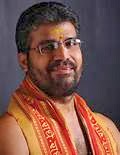The Process of Yoga : 2.3 - Swami Krishnananda.
===============================================================
===============================================================
Monday, March 14, 2022. 06:00.
Chapter 2: The Structure of the Universe-3.
===============================================================
Here is the beginning of what is known as the Copernican Revolution in philosophy. It is called the Copernican Revolution because it was a kind of change brought about which was equally as shocking as the revelation brought to the world by the scientist Copernicus. He proclaimed to the world that the Earth revolves round the Sun rather than the Sun revolves around the Earth. We thought that the Earth is the centre of creation and that the planets, including the Sun, are only satellites. Not so was the conclusion of Copernicus. We are not the centre of creation. The Earth is a satellite of the Sun and, therefore, the Sun is the centre rather than the Earth. Such a revolution is called the Copernican Revolution in science.
In philosophy also, a revolution was brought about by this tremendous, heartbreaking conclusion to the world of philosophy that if to exist is to be perceived, then it is difficult to live in this world. But we cannot refute this theory. If we cannot accept, or do not want to accept, that to exist is to be perceived, then we have to accede or concede many other facts which we are not prepared to accept ordinarily. If something can exist even if it is not perceived, then anything can exist even if it is not perceived. How can we say that anything can exist even if it is not perceived? But that is the logical conclusion. We cannot refute our own logic. The very same logic that proves our existence even if we are not seen by anybody in the world can also prove the existence of anything else even if it is not seen by anybody.
Well, can we imagine a condition of creation when the Earth was alone without any human being on it? How do we know that the Earth existed when nobody saw it? Somebody should see an object in order that it may be proved to exist. But according to our astronomy, geology, and so on, perhaps the Earth did exist as a boiling mass descended from the orb of the Sun aeons before anything could have lived on it. How can we know that the Earth existed? By inference. We cannot perceive it. By inference from perceived facts we conclude that the Earth ought to have existed even if no living being was crawling on its surface.
So now we come to another proof, called inference. Even if a thing is not perceived, it can exist by the conclusion of inference. Therefore, to exist is not necessarily to be perceived; otherwise, the Earth could not exist when nobody was there to see it. If we were not there, the Earth was also not there. That will be the conclusion. But we are not prepared to accept this funny conclusion. Even if men were not on the surface of the Earth, the Earth did exist many millions of years ago. How do we know this? By inference. Therefore, the proof of the existence of a thing is not necessarily perception; it could also be inference. We can draw the conclusion inferential that something ought to exist.
Let us not go beyond these two proofs for the time being. There are two proofs at least – perception and inference. Perception tells us that earth exists, water exists, fire exists, air exists and ether exists. But we cannot wash off our hands merely with the theory of perception. We have already accepted that there is something called inference or logical deduction. If the five elements are to be accepted as existent because they are perceived, can we also draw some other conclusion from inference? What could be prior to the manifestation of the five elements? Just as we concluded that prior to the revelation of life on Earth, Earth could have existed, what could have existed prior to the manifestation of the five elements? We have to conclude this fact by inference alone because this fact is prior to the manifestation of the five elements and, therefore, it lies outside the ken of perceptional logic.
To be continued ....
================================================================






Comments